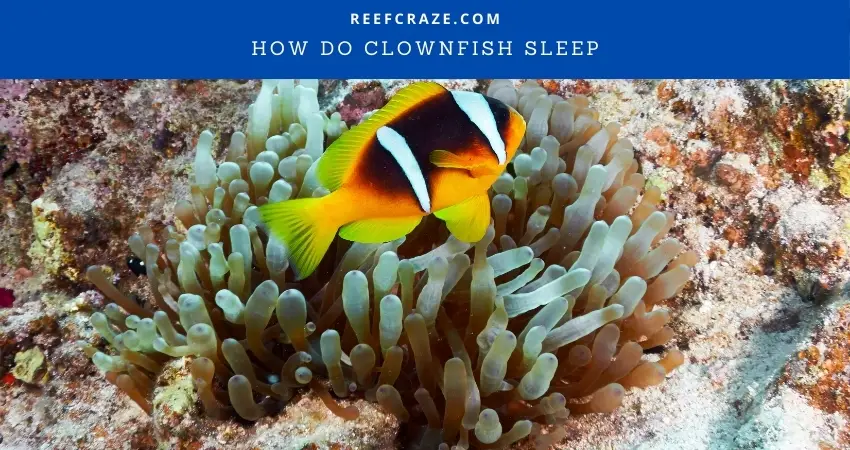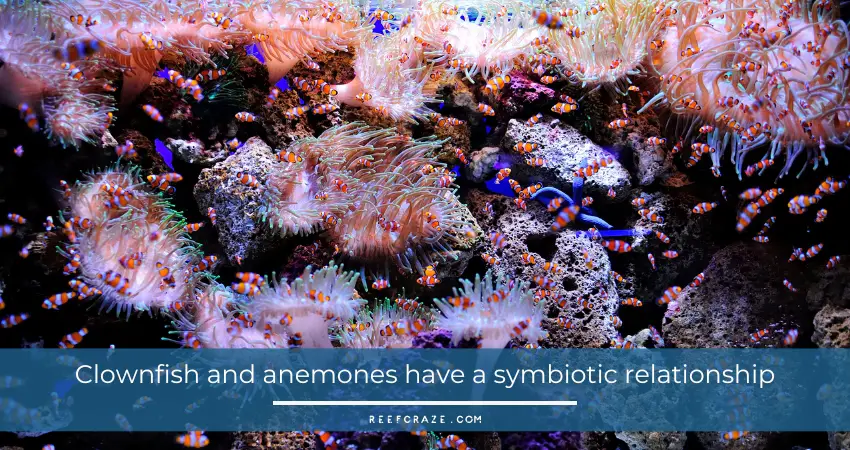Every fish owner becomes curious to learn more and more about their little friend inside the fish tank. And if it is a clownfish that you have, the curiosity becomes endless. One of the first things that a clownfish owner asks is: how do clownfish sleep?
Clownfish often sleep at the bottom of the tank. They will lie motionless as they sleep. But you can even spot a clownfish sleeping while floating. Sometimes, they prefer sleeping inside the anemones or close to hollow shells to avoid predators.
While some fish owners wonder if clownfish sleep, many want to know how they sleep or have a sleeping pattern. So let me guide you through a clownfish’s sleeping behavior and more with this article.
Do Clownfish Sleep?
Like many fishes, clownfish also sleep. These fish sleep at night, but they often take a nap or doze off during the night. You can find them lying at the bottom of your fish tank or hovering as they sleep.
Clownfish do not have a fixed sleeping pattern. However, they often follow a sleeping cycle throughout the day. But it can be a little challenging to tell if the fish is sleeping as they do not have any eyelids.
Fishes do not sleep like most animals or mammals. Their sleeping behavior is so strange that it is not unusual to assume that your clownfish is dead. So it is best to learn how clownfish sleep or how to know that it is sleeping.

How Do Clownfish Sleep?
Unlike humans, clownfish do not sleep on their backs or sides. But they do sleep in various positions. And as clownfish do not have eyelids, they are forced to keep their eyes open even if they sleep.
So how do you know if your clownfish is sleeping? Though it is hardly noticeable if the clownfish is sleeping unless you pay attention, you can look for the following signs to know that.
- Every living creature maintains a particular posture as they sleep. In the case of humans, we lie on our backs and sides. Animals rest in different positions while horses sleep standing. And clownfish sleep in various postures as well.
- Sleeping makes everyone enter an inactive mode. They become less active and keep going in and out of trances. Clownfish can hardly stop swimming. So if it slows down, it means your fish will take a nap.
- It becomes challenging to wake a sleeping person, even fish. Any sudden movement or giving food will not wake them.
- Your fish will wake up after a specific time and go back to its usual surfing and hiding game. Once you notice their sleeping and active times, you will learn about their sleeping schedule.
If your clownfish shows all the above signs, it is definitely sleeping. And it would be best if you let it sleep because it is the only way for them to recharge their energy.
Sometimes, you will find them sleeping inside the anemones, and other times they will sleep while hiding under the shelters. It is their way of protecting themselves from predators as they sleep. But it is not unusual to find them sleeping at the bottom of the aquarium.
Clownfish Sleeping Behavior
How do clownfish sleep? That’s a question the newbies always ask because they get confused with clownfish’s sleeping behavior. Since this fish is a continuous swimmer and even floats during float sometimes, it is challenging to tell the difference between sleeping and awake clownfish.
To understand if your clownfish is sleeping, try adding stimulation. But try doing it without startling the fish. The best option is to add some food to see if they come to eat. If they don’t, that’s because your clownfish is asleep.
But remember that clownfish can become lethargic or slow-mover when they are sick. That’s why it becomes challenging to understand if your clownfish is sleeping, sick, or dead.
The first sign of a sick clownfish is its lack of activity. A healthy clownfish barely stops swimming unless it is sleeping. So if you notice the fish is less active than usual or is swimming slow, it could be a sign of illness. However, if the fish remains inactive during the same hours of the day, that can mean your clownfish is sleeping.
Most clownfish do have a fixed sleeping pattern. If you do not notice it, you can end up with a dead clownfish without realizing it.
But don’t scream your lungs out if you notice your clownfish lying or floating at the bottom of the aquarium. Most clownfish sleep like that, which is pretty frightful for an owner.
Why Do Clownfish Sleep?
Humans are not the only living thing that needs sleep to function correctly. All the animals, birds and fishes need it too. Clownfish sleep for this reason as well.
Though a clownfish’s brain does not function as a human, it still needs sleep during a certain period of the day. It helps the fish get back its energy and swim around the tank.
When Do Clownfish Sleep?
Humans sleep during the night, so do most animals. Then there are nocturnal species that sleep during the day but stay awake at night.
Nocturnal fishes are not easy to keep and maintain. And another trouble with having such fish is that their tank mates will be awake when they sleep. And it is not unusual for a sleeping fish to end up becoming food for its tank mates.
Lucky for you and your clownfish, they are not nocturnal. Clownfish sleep at night like most other creatures. It makes them easier to maintain.
Clownfish will swim, hunt and eat during the day hours. But once it starts getting dark, the fish will become less active. It can become inactive if the tank is in a shady area. To make sure your clownfish’s sleeping habit does not get hampered, you can keep the tank light on throughout the day.
Can Clownfish Sleep Without Anemones?
There are rumors that clownfish cannot sleep without anemones, but it is not valid. However, clownfish have a unique relationship with anemones.

While most fishes do not get along with anemones, clownfish’s relationship with anemones is the opposite. Anemones are notorious in the wild for stinging and killing other fish with their tentacles.
Clownfish are the only fish that can survive living in anemones, and their aggressive behavior keeps small fishes at bay that eat anemones. On the other hand, if a large fish tries to attack the clownfish, the anemones will kill it.
That’s why the relationship between clownfish and anemones is called Symbiotic Relationship. It is an example of two organisms using each other for their benefit.
Frequently Asked Questions
What Do Clownfish Sleep In?
This is beneficial for both of these organisms. The anemones protect the clownfish from predators with their tentacles. And the clownfish chases away butterflyfish that eat anemones and defend them.
Do clownfish sleep on the sand?
Do Clownfish Stop Swimming?
If the fish moves slowly for a certain period and then starts swimming again, it could be sleeping or taking a nap. But if you notice the fish is unmoved for a long time and its color seems to be fading, it means your clownfish is either sick or dead.
What Do Clownfish Eat?
If you have clownfish in your aquarium, you can provide them with live rotifers or brine shrimps. And make sure to keep the tank light on as clownfish need light to find their food.
How Many Clownfish Can I Keep In A Tank?
It is ideal not to keep more than two clownfish in a tank. While clownfish can live alone in an aquarium, you can keep one male and a female together.
Keeping multiple clownfish together leads to the aggressive behavior of the mating couple towards the other fish. As you may already know, once the female and male mates get their gender, the rest of the fish in the tank remain sexless. So it is safe to remove them from the tank as it affects their growth.
How Long Do Clownfish Live?
In the wild, a clownfish lives for 6 to 10 years. Unfortunately, they do not live that long if you keep them in a tank. A captive clownfish lives only 3 to five years. And if you do not provide it with what it needs, it can die earlier than that.
A clownfish becomes an adult in 2-3 years. That’s why professional aquarists always advise keeping the clownfish in their natural habitat, as moving them shortens their lifespan.
Final Words
Clownfish are just another type of fish that acts like humans in some ways. It stays active during the day and sleeps at night or whenever it finds a shady area in the tank. This habit makes it easier for the clownfish owner to keep track of its sleeping behavior.
But how do clownfish sleep? The answer is: lying at the bottom of the tank, floating or inside the anemones and hollow shells.
The best way to improve its sleeping habit is to ensure the tank gets light for 12 hours and darkness for 12 hours. This will create a body clock in the clownfish and help you understand whether the fish is sleeping or sick.
